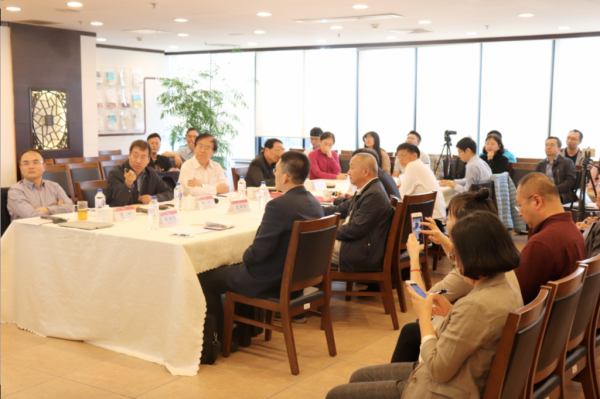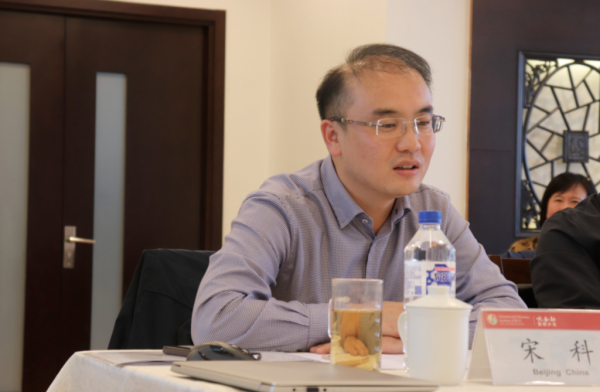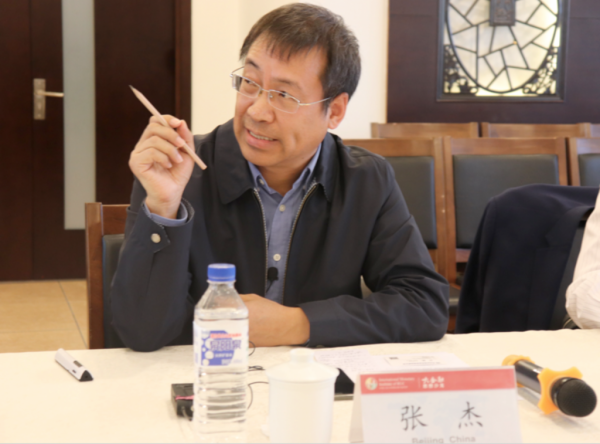Macro-Finance Salon (No.100): Finance Encounters China’s Financial Reform
2018-10-09 IMI
 Professor Zhang Jie interpreted the "Encounter" and its unknown results. Then, he pointed out that the accidental encounter and unknown results partially originated from the differences between the East and West in knowledge, theory and thinking. In particular, mainstream economics and finance were constructed during China’s decline, so mainstream economics seemingly neglected China for a long time. As China’s economy developed remarkably in a different way over the four decades, mainstream economics could not illustrate Chinese case. Professor Zhang Jie also pointed out that many Chinese returnees copied Western mainstream economic frameworks to study Chinese case, whereas foreign scholars conducted “field studies” in China to develop new theories and have a say in Chinese stories. Professor Zhang Jie cited sinological institutes as the consequences of losing the rights to interpret Chinese case. He called for discovering China's problems, sorting out China's logic, and replaying China's role.
Professor Zhang Jie interpreted the "Encounter" and its unknown results. Then, he pointed out that the accidental encounter and unknown results partially originated from the differences between the East and West in knowledge, theory and thinking. In particular, mainstream economics and finance were constructed during China’s decline, so mainstream economics seemingly neglected China for a long time. As China’s economy developed remarkably in a different way over the four decades, mainstream economics could not illustrate Chinese case. Professor Zhang Jie also pointed out that many Chinese returnees copied Western mainstream economic frameworks to study Chinese case, whereas foreign scholars conducted “field studies” in China to develop new theories and have a say in Chinese stories. Professor Zhang Jie cited sinological institutes as the consequences of losing the rights to interpret Chinese case. He called for discovering China's problems, sorting out China's logic, and replaying China's role.
 Professor Zhang Jie shared his views on mainstream economics’ failure to explain China's financial reforms. He believes that China's banking system has basically stabilized in the past four decades. The concentration of China’s banks is not as high as that of US., Canadian and other banks. It is reasonable to reduce large banks’ market share, because the banking system is of limited competition and not better to allow wider access.
Some people hold the view that “The central bank of China is using foreign exchange instead of treasury bonds as a major component of assets, and therefore it is ‘the small country central bank’”, Professor Zhang argued that it is inappropriate to judge the scale of the central bank by simply looking at the fact that there are more foreign exchange reserves or more government bonds in assets. It is still a small line, and the People's Bank of China is still one of the big central banks of the world. Regarding the question of whether the People's Bank of China has independence, Professor Zhang explained that China's central bank has strong independence theoretically according to the data of China's past high growth and low inflation, but Zhang also pointed out that it should not be emphasized that the People's Bank of China should be independent of the government. The central bank should be independent from the government with more interests.
During the meeting, various questions raised by Professor Zhang also caused the collisions of thoughts and consonance among the guests. Other guests such as Wei Benhua, Wei Gejun, Wang Guogang, Xiao Ruiyan, Wang He also expressed their opinions and conducted in-depth exchanges on the above issues, which were fruitful, vivid, and interesting.
The Macro-Finance Salon is a high-level academic salon jointly established by the International Monetary Research Institute of the People's University of China and the Department of Monetary and Finance of the School of Finance. The salon is divided into four categories: “policy experts”, “academic experts”, “elites of industries” and “young scholars”. Based on China's practice, the salon keeps up with the international frontier, build a high-level, professional and open academic exchange platform to promote the construction of the "big finance" discipline in the new era and carry out the "big finance" theory, policy and strategy research.
The concept of "big finance" is derived from the basic idea of the combination of macro and micro financial theory advocated by Professor Huang Da. It is conceptually derived from the systematic thinking of finance and the real economy as an inseparable organic whole. Chen Yulu, deputy governor of the People's Bank of China, systematically demonstrated the basic connotation and methodology of the "big finance" proposition in "The Outline of Big Finance", and built a "big finance" that is conducive to promoting long-term economic growth and enhancing national competitiveness. The salon lays the theoretical and empirical foundation for such a system.
Professor Zhang Jie shared his views on mainstream economics’ failure to explain China's financial reforms. He believes that China's banking system has basically stabilized in the past four decades. The concentration of China’s banks is not as high as that of US., Canadian and other banks. It is reasonable to reduce large banks’ market share, because the banking system is of limited competition and not better to allow wider access.
Some people hold the view that “The central bank of China is using foreign exchange instead of treasury bonds as a major component of assets, and therefore it is ‘the small country central bank’”, Professor Zhang argued that it is inappropriate to judge the scale of the central bank by simply looking at the fact that there are more foreign exchange reserves or more government bonds in assets. It is still a small line, and the People's Bank of China is still one of the big central banks of the world. Regarding the question of whether the People's Bank of China has independence, Professor Zhang explained that China's central bank has strong independence theoretically according to the data of China's past high growth and low inflation, but Zhang also pointed out that it should not be emphasized that the People's Bank of China should be independent of the government. The central bank should be independent from the government with more interests.
During the meeting, various questions raised by Professor Zhang also caused the collisions of thoughts and consonance among the guests. Other guests such as Wei Benhua, Wei Gejun, Wang Guogang, Xiao Ruiyan, Wang He also expressed their opinions and conducted in-depth exchanges on the above issues, which were fruitful, vivid, and interesting.
The Macro-Finance Salon is a high-level academic salon jointly established by the International Monetary Research Institute of the People's University of China and the Department of Monetary and Finance of the School of Finance. The salon is divided into four categories: “policy experts”, “academic experts”, “elites of industries” and “young scholars”. Based on China's practice, the salon keeps up with the international frontier, build a high-level, professional and open academic exchange platform to promote the construction of the "big finance" discipline in the new era and carry out the "big finance" theory, policy and strategy research.
The concept of "big finance" is derived from the basic idea of the combination of macro and micro financial theory advocated by Professor Huang Da. It is conceptually derived from the systematic thinking of finance and the real economy as an inseparable organic whole. Chen Yulu, deputy governor of the People's Bank of China, systematically demonstrated the basic connotation and methodology of the "big finance" proposition in "The Outline of Big Finance", and built a "big finance" that is conducive to promoting long-term economic growth and enhancing national competitiveness. The salon lays the theoretical and empirical foundation for such a system.
